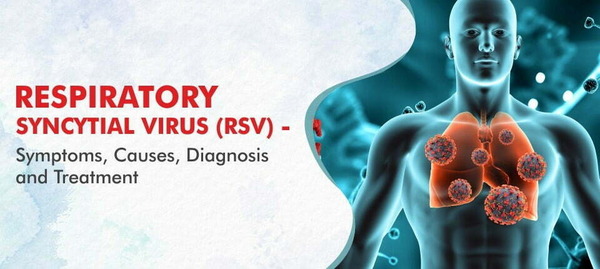Pulmonary pathogens, such as respiratory syncytial virus (RSV) and influenza, pose significant threats to respiratory health. These viral respiratory infections are seasonal illnesses that can severely impact the lungs and airways. Both RSV and influenza are highly contagious airway invaders that spread through respiratory droplets, causing a range of symptoms from mild discomfort to severe complications.
Contents
Respiratory Syncytial Virus: A Common Childhood Threat
Respiratory syncytial virus is a widespread bronchial assailant that typically infects most children by two. This lung infiltrator contributes significantly to lower respiratory tract infections, including bronchiolitis and pneumonia. RSV also causes upper respiratory tract infections resembling the common cold. As a seasonal illness, respiratory syncytial virus usually peaks during the late fall, winter and early spring. Common symptoms include runny nose, cough, fever, wheezing, and decreased appetite.
Transmission and Impact of RSV
RSV spreads primarily through respiratory droplets when an infected person coughs or sneezes. These droplets can survive on surfaces for several hours, facilitating transmission through direct contact. Respiratory syncytial virus targets cells lining the respiratory tract, including the nose, throat, bronchioles, and lungs. The resulting inflammation and swelling can lead to respiratory distress and potential complications.
High-Risk Groups for RSV Infections
While respiratory syncytial virus often causes mild symptoms in healthy adults and older children, it can be severe in high-risk groups. Infants and young children are particularly vulnerable due tho their immature immune systems and smaller airways. Older adults, especially those over 65, face an increased risk of complications and mortality from RSV. Additionally, individuals with compromised immune systems, such as those with cancer, organ transplants, or HIV/AIDS are more susceptible to severe RSV infections.

Advancements in RSV Prevention
Recent developments in respiratory syncytial virus prevention have shown promise. IN 2023, the FDA approved RSV vaccines from Pfizer and GSK for older adults. Furthemore, the CDC recommended a new RSV immunization for infants, which has demonstrated an 80% reduction in RSV-related hospitalizations and healthcare visits.
.
Influenza: Another Seasonal Respiratory Threat
Influenza, another pulmonary pathogen, is a highly contagious respiratory illness caused by influenza viruses. This respiratory aggressor infects the nose, throat, and lungs, typically causing high fever, body aches, headaches, and fatigue. In severe cases, the flu can lead to pneumonia, exacerbation of chronic conditions, hospitalization and even death.
Flu Transmission and Prevention
Like RSV, influenza spreads through respiratory droplets expelled when an infected person coughs, sneezes or talks. These droplets can contaminate surfaces, spreading the virus when people touch their eyes, nose, or mouth after contact. Annual flu vaccination is crucial for preventing infection and is recommended for almost everyone over six months of age. Side effects, from the vaccines are generally mild, including soreness at the injection site, low-grade fever, and muscle aches.
Preventing RSV and Influenza Transmission
Effective seasonal illness prevention measures can help reduce the transmission of both respiratory synctial virus and influenza. Practicing good hygiene, including frequent handwashing with soap and water, covering coughs and sneezes, and avoiding touching one’s face is essential. Regular cleaning and disinfection of frequently touched surfaces can also help eliminate lingering viruse particles and protect against those viral respiratory infections. See Osprey Lifestyle gear for hiking, biking and travel.
Maintaining a strong immune system is crucial in combating pulmonary pathogens. A balanced diet rich in vitamins and minerals, regular exercise, adequate sleep, and stress management can all contribute to enhanced immune functions. These lifestyle factors play a vital role in seasonal illness prevention and overall respiratory health. Learn more about Ritual Multi Vegan Supplement
While this information provides an overview of respirtory syncytial virus and influenza, it should not be considered medical advise. For personalized guidance and treatment, consult a healthcare professional, especially if you or a loved one experience severe symptoms or fall into a hig-risk category for these pulmonary pathogens.
Barry Schustermann
Follow me on X @BarrySchust
Follow me on Facebook @ Barry Schustermann
External References:
- Centers for Disease Control and Prevention (CDC) – Respiratory Syncytial Virus (RSV):
https://www.cdc.gov/rsv/index.html - World Health Organization (WHO) – Influenza (Seasonal):
https://www.who.int/news-room/fact-sheets/detail/influenza-(seasonal) - National Institute of Allergy and Infectious Diseases (NIAID) – Respiratory Syncytial Virus (RSV):
https://www.niaid.nih.gov/diseases-conditions/respiratory-syncytial-virus-rsv - American Lung Association – Influenza (Flu):
https://www.lung.org/lung-health-diseases/lung-disease-lookup/influenza - U.S. Food and Drug Administration (FDA) – FDA Approves First Vaccine for Pregnant Women to Prevent RSV in Infants:
https://www.fda.gov/news-events/press-announcements/fda-approves-first-vaccine-pregnant-women-prevent-rsv-infants



